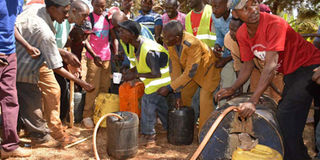Governor Waititu walks a tightrope in war against illicit liquor

Recovering alcoholics demonstrate how illicit brew chang'aa is made, in Gatundu North, Kiambu County, on February 15, 2018. PHOTO | ERIC WAINAINA | NATION MEDIA GROUP
What you need to know:
- Mr Waititu has asked all bar owners to seek fresh licences in bid to weed out those who are selling illicit alcohol.
- KRA says there are watertight measures to ensure that neutral spirit, the key component of illicit brews, does not fall to unlawful hands.
Critics have queried tactics being used by Kiambu Governor Ferdinand Waititu in his quest to eradicate illicit brews.
A populist move to close several bars in the county mirror the one used by national government in 2015, which had minimal results.
Incidentally, it was Mr Waititu, as Kabete MP, who lit the spark that led President Uhuru Kenyatta to direct MPs and national administration officials to close all factories manufacturing the illicit brews.
In the latest tact, Mr Waititu has asked all bar owners to seek fresh licences in bid to weed out those who are selling illicit alcohol.
In both scenarios, the issue of availability of easy materials for manufacturing the illicit brews have been avoided and instead the county government and the national government are more focused on the sellers.
TASK FORCE
But even as Mr Waititu fights what is seen as an insurmountable battle plagued with self-inflicted mistakes, the national government appointed a task force in 2015 on illicit brews and it is yet to hand over its report.
For three days, Ministry of Interior and National Coordination spokesman Mwenda Njoka did not respond to our queries about the existence of the task force three years after it was formed.
The inter-agency task force for control of potable spirit and the eradication of illicit brews was appointed on July 2015 by then Interior Cabinet Secretary, the late Maj Gen (Rtd) Joseph Nkaissery, with a seemingly open-ended time frame to complete its mandate.
Its terms of reference included to undertake a full audit of all alcoholic drinks, potable spirits and illicit brews in the Kenyan market and their manufacturers and recommend the suspension and recalling of harmful products.
NEUTRAL SPIRIT
It was also to inspect all the premises manufacturing alcoholic drinks and recommend measures of control, including the closure of production premises and review the various legal instruments applicable in regulation of alcoholic drinks.
Currently, the national government is engaged in Rapid Results Initiative to get rid illicit brews.
According to the Kenya Revenue Authority, there are watertight measures to ensure that neutral spirit, the key component of illicit brews, does not fall to unlawful hands.
“Neutral spirit is sold to only licensed manufacturers.
"The manufacturers are then required to account for all the neutral spirit purchased through input-output formulation and affixing of excise stamps on the finished packages meant for retail sale.
"The distillers also submit periodic reports to KRA on all production and sales of neutral spirit,” commissioner for domestic Taxes Benson Korongo said.
DISTILLERS
He said Kenya has four distillers that produce the product for sale, which include Mumias Sugar Company Ltd, Agro Chemicals and Food Company Ltd, Kibos Distilleries Ltd, Spectre International Ltd and two who produce for their own consumption being London Distillers Ltd and Jjasm Mini Distillers Ltd.
Mr Karongo said domestic taxes include Excise Duty at a specific rate of Sh200 per litre and VAT at a rate of 16 per cent of the taxable value.
In January, Sunday Nation reported that unscrupulous traders are using cargo containers loaded with cereals meant for the Kenyan market to conceal illegal ethanol (the main ingredient for producing potable spirits) imports and avoid paying taxes.
But even as the national government fumbles with its strategy, Governor Waititu has attracted national attention, friends and foes.
He first amended the County Alcoholics Drinks Act where it was required all new bar owners to reapply for the licences.
REHABILITATION
The county government is also spending an estimated Sh1.2 million every day on alcoholic addicts it has informally engaged to undertake casual jobs as part of rehabilitation programme.
He announced that his administration has in the past few weeks engaged 3,000 alcoholics, mostly youth in the programme, and it is paying them Sh400 each per day.
The county offers the youth breakfast and lunch and in the evening, they each pocket Sh300 after doing manual jobs such as collecting garbage and clearing bushes.
Kiambu has 60 wards, and with the programme expected to benefit 100 people from each one of them, the number of beneficiaries will increase to 6,000.
Kiambu Liquor Welfare Group, the umbrella body for bar owners, say Mr Waititu’s efforts will not yield the intended results.
“The county government has been raiding bars and all they are doing is impound drinks that have passed the test of government agencies,” Mr Richard Kagiri, the group's chairman, said.
ADDICTS
He said the county government is conducting its affairs outside the law since several hired people are conducting searches instead of police as the law provides.
“Waititu has become [the] Kenya Bureau of Standards, Kenya Revenue Authority and all other agencies rolled into one, his tactics won’t result to the end of illicit brews,” he said.
The war on illegal brews and rehabilitation of addicts has also attracted the attention of Kiambu Woman representative Gathoni wa Muchomba, who said there were indications that the county was not getting the value of money being spent.
“The most shocking thing is that a number of the addicts being rehabilitated at Makwa centre are using the Sh300 given to them by the county government to buy alcohol,” she said.






